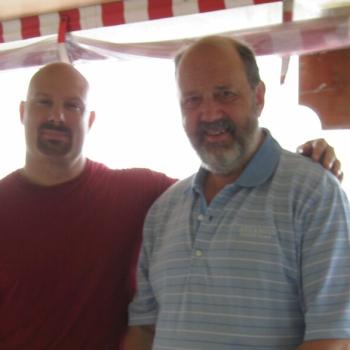Years ago Volkswagen ran a commercial that started with photos of a funeral procession—a long, black hearse followed by endless, shining limousines. In the background the voice of the deceased recounted the details of his last will and testament:
I, Maxwell E. Snavely, being of sound mind and body, do hereby bequeath the following: To my wife Rose, who spent money like there was no tomorrow . . . I leave 100 dollars and a calendar. To my sons Rodney and Victor, who spent every dime I ever gave them on fancy cars and fast women . . . I leave 50 dollars, in dimes. To my business partner Jules, whose only motto was spend, spend, spend . . . I leave nothing, nothing, nothing. And to my other friends and relatives who also never learned the value of a dollar . . . I leave a dollar.
Behind all of the limos, of course, was a young man driving a small black VW Beetle. As he weeps and smiles gently, the deceased concludes:
Finally, to my nephew Harold, who oft-times said, "a penny saved is a penny earned," and who also oft-times said, "Gee Uncle Max, it sure pays to own a Volkswagen" . . . I leave my entire fortune of one hundred billion dollars.
The script makes for great advertising. It's memorable. It targets an experience that everyone can imagine—even if they've never been there—and it draws a sharp, dramatic, and (the first time around) unexpected contrast. It even made its way onto a show called "The World's Funniest TV Commercials."
But what makes for good advertising doesn't necessarily make for good living, however. A last will and testament should not be a final word of judgment, an act of pique, an effort at exacting vengeance, or a last attempt to assert control over those we love. There is a difference between final, healing words and a parting shot.
A parting shot puts an end to the conversation that is our lives together. It forecloses on the possibility of healing and forgiveness. And it memorializes a moment that defines the past. Leave a will that also serves as a parting shot and it will be difficult for anyone—even someone close to you—to remember the texture, complexity, and gifts that are inevitably a part of lives that are always uneven and messy.
There are endless legal complexities to writing a will, of course, and those details require attention. But they should not dominate the process. Writing one should be and can be a spiritual exercise.
At a minimum, it might be helpful to do these things:
One: Find a way to celebrate the relationships that have blessed you.
It is no accident that relationships shape our lives. It could be argued that the most important dimension of Trinitarian theology is the emphasis that it places on love and relationship—God, three in one, Love seeking to love. So, it is no small wonder that we depend upon and thrive thanks to healthy relationships.
Those relationships may not lie within your family. Growing up together and sharing the same name creates a context for friendship, but it doesn't guarantee it. There is something as random about family connections as there is about all the other relationships that shape our lives. Blood is not thicker than water and there is a difference between a family of chance and a family of choice.
Celebrate your family of choice. Let go of the need to make the family of chance work.
Two: Look for hopeful ways of thinking about the future.
For Christians, at any rate, the end is not the end. One of the things that has narrowed and impoverished Christian spirituality is the notion that life is a heaven or hell, saved or damned, tableau through which individuals walk and with which everything comes to an end.
God's work embraces us as individuals, to be sure. But the outworking of God's will is a far larger undertaking and it is not all about us. Our lives gain meaning by taking their place in the life and work of God, not because God takes a place in our small lives.
That's a hopeful thing. It doesn't diminish us. And, properly understood, we don't disappear into it. Find a way to register that you leave this dimension of our lives together, deeply embraced by the people of God who are not just part of something happening now, but which has a future as well.
Three: Memorialize the values that shaped your life.





